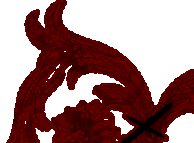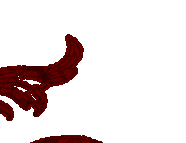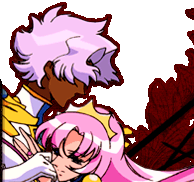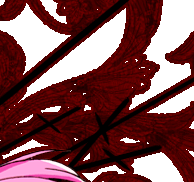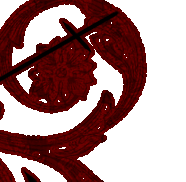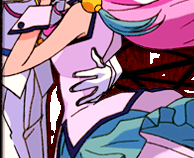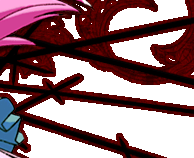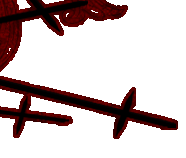
Out of a cast of alarmingly dynamic characters, Saionji stands as a study on the contrasts within. For most of the series, he’s a model of stress hypertension; we rarely see him without his defining scowl, and if he should grace us with laughter, it’s bitter and cynical. Where Touga can honey words meant to do harm, Saionji seems incapable of speaking kindly to anyone, even those he cares about. Where Juri’s swallows the bitter pill of her self-loathing, Saionji spits it out at everyone else, until they hate him every bit as much as he thinks they should.
Then there’s Wakaba’s dorm room. A man that’s at best bitter-tongued and at worst explosively violent, manages to experience such a calm in the storms of both his own life and the goings on at Ohtori Academy? There’s no conversation or lengthy internal dialogue to tell us what was going on in Saionji’s head during his stay with Wakaba, but there is the staggering change in his behavior during that time, and nothing illustrates that change quite as strongly as body language.
First, it would be impossible to approach these scenes without mentioning how comedic exaggeration is used in them. Saionji does a silly wiggle to get out from under the bed, and Wakaba falls flat on her face from tugging against his grip on her hands. It would be going out on a limb to interpret such behaviors seriously. Would Saionji really break into streaming tears when Wakaba insists he stay? Probably not. However, there can be no exaggeration without something to exaggerate for the purposes of illustration: though absurd at face value, even the comedic stumbling and strange behavior exhibited by Saionji in these scenes represents something real. It’s no mistake that the sentiments the series chose to convey this way would otherwise have been difficult to express in the medium; instead, they are exaggerated to the point where they are noticeable.
Point of view accounts for another distortion of these scenes. There are moments where one gets the distinct impression we’re seeing Saionji the way Wakaba sees him. It is, after all, quite odd that a character that spent the first arc beating a woman is suddenly romanticized with sparklies when he throws his head back. Those sparkles certainly weren’t actually there, and though we see them often in anime, we don’t see them often in Shoujo Kakumei Utena. They’re part of Wakaba’s train of thought; a swooning reaction to her crush. It doesn’t appear to influence his body language, but it’s worth noting simply for what it says about Wakaba and her image of her prince.
Enough of that, let’s dig in! We’ll be approaching this shot by shot, and I will discuss each in turn before bringing it all together to a conclusion.
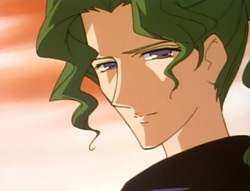 This shot sets the tone for his stay with Wakaba. Baseline behaviors from the Student Council Arc and even the series after these events are completely absent. We expect visible irritation from him: eyebrows drawn together and curved down, and a constant sneer on his lips. Stick straight posture and a lifted head, clenched fists and constricted pupils. All the signs of a raging inferiority complex hiding under a thin exterior of false pride.
Yet here Saionji’s eyebrows are straight, even slightly upturned for how this animation style draws them. They’re nearly parallel to his eyes, indicating a relaxed forehead, and so a lack of tension in muscles that tighten involuntarily when a person is in an aroused (particularly negative) state. Rigidity in the shoulders betrays the same tension, and it’s why overstressed people often have back problems. Saionji is one of those, but not here. Even the characteristic tight lips and sneer are gone: he’s smiling, calm, with none of his usual cruel amusement or bitter humor.
Wide open eyes contrast the narrowed ones we ordinarily see. We narrow our eyes, squinting at times, when we’re about to fight or see something coming, and that preparedness for hostility is constant in Saionji. Here, even his pupils, which are usually constricted, are dilated. By drawing the iris larger than usual, the art style is accounting for this unconscious reaction to stress or the lack thereof. Dilated pupils indicate that someone is relaxed, comfortable, even peaceful. Amusement, aggression, fear and displeasure are the hallmarks of constriction, so that there’s dilation here tells us that Saionji has put aside his usual tension and worry for an uncharacteristic calm.
Dilation also indicates pleasure at what you look at. For example, you can tell who likes what in an art gallery by the status of their pupils. It’s worth noting then that his stay dilated when he looks at Wakaba. For that matter, looking directly at Wakaba is itself a strange thing for him to do; Saionji habitualizes passive domination, where a person creates an air of superiority by not looking at the person they speak to. Akio and Touga use this to excellent manipulative effect, but for Saionji it’s a defensive measure, meant to create distance and hold up the rickety structure of his self-esteem by avoiding anything that could disrupt it. Even more telling of this difference is that he rarely merely looks away. He closes his eyes entirely; not only cutting off the person he’s communicating with, but everything around him, like the ostrich burying their head in the ground. Yet here, Saionji looks at Wakaba when he speaks, and there’s no effort made to assert superiority by passively belittling her.
Finally, Saionji turns his head to face her, but does not disturb the position of his body to do so, though it faces away. The anticipation of danger leads people to immediately swing their whole body in the direction of an attack. He expects no such thing from Wakaba, who he’s relaxed in the presence of, even intimately so for how uncommon that is. He’s like this with absolutely no one else.

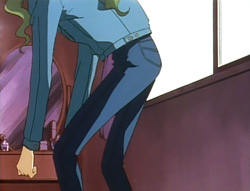 This is the reluctant departure. Most people are not going to stand suspended like that for any period of time, but it’s a familiar gesture; we often see people get up slowly, slumping their shoulders with their arms are lowered, pausing halfway through. Usually the hands are braced on something, a table or the person’s knees. Either way, the attempt to get up is made while sending every possible signal the body can to suggest it wants to stay. The specifics of this gesture tend to vary from person to person, however the common thread is some sequence of actions that should occur fluidly and relatively quickly is being broken into specific gestures, or slowed to the point of being noticeable.
In Saionji’s case, he’s getting up so slowly that he stops, and his body slumps by the unnatural situation of dragging out the gestures involved in getting up. He never does accomplish this, which is where there’s a bit of exaggeration. Saionji waits for her to comment on his leaving before he stands up straight. In reality it usually takes longer to elicit a response than it takes to stand up, no matter how you drag it out. People doing this are gambling on the hope that their host will still want them there, or at least feel guilted and polited into offering to have them stay. Saionji realizes on some level how this works. While it’s a matter of politeness to try and leave while his hostess is present, he also no doubt realized she wouldn’t let him. When he makes a serious attempt to leave, he does it behind her back. 
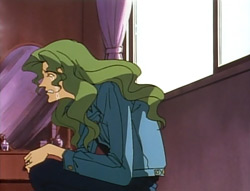 Once she shoots down his noble effort to relieve her of a source of trouble and stress, Saionji slumps right back down, with anime-style tears. This is more comedic exaggeration. In real life it would be watery eyes that don’t really spill over, with highly upturned eyebrows and slightly parted lips; all gestures that prelude crying, but aren’t likely to result in it. This is what it looks like when a person’s genuinely touched. It’s the expression you see when you give someone the perfect gift: slightly vulnerable, glassy eyes, mouth open like there’s a ‘thank you’ they can’t quite formulate to their satisfaction. Saionji’s touched by her gesture, although why is perhaps more selfish than valuing her love and adoration: he’s glad to stay. The way he lingers on how helpful she’s been, and how shameless he is to be bumming with a lower classman, betrays his pride, but considering how strung up on pride Saionji is, he’s being rather easygoing about it. The Saionji we’re familiar with would be consumed with misery and self-loathing for doing something like this. He’d yammer constantly about his deplorable position and how he’d kill the people who did this to him, and most of all, he’d be desperately trying to get out, and put as much distance between himself and this shameful thing as he possibly can. He doesn’t, though. All things considered, he doesn’t appear terribly bothered by this while he’s in the thick of it.

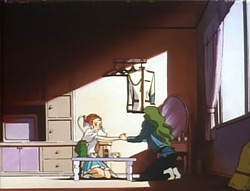 Wakaba’s hands come into easy reach when she sets down his cup of coffee, and Saionji is unable to resist grabbing them. This ultimately leads to another comedic exaggeration; Wakaba tugs so hard against his grip that she falls back on the floor. Accounting for that exaggeration, there’s still a lot to read into here.
Grabbing is one part of Saionji’s behavior that is consistent throughout the series. He is used to grabbing people to get their attention. He grabs Anthy when he speaks to her, he grabs Utena when he comes to at the entrance of the duel arena in episode nine, and here he’s grabbing Wakaba while saying something especially important to him. It’s hard to pin down where he got this habit, but it’s irrevocably connected to the violence he uses to the same purpose. Either way, Saionji is used to using aggressive physical contact, even if it’s not hostile, to get attention, especially from women. This is the kind of thing that could have developed from two possible beginnings that might not be mutually exclusive. Saionji’s excessive use of physical contact could have evolved from perceived necessity; no one listened to him so he had to develop a way to force the point. However, it might also have evolved from a natural lack of need for personal space on his part; he might just be a touchy-feely type of person, so that his primary means of communication relies heavily on contact.
He grabs Wakaba in an attempt to emphasize his words, injecting by force meaning into something he wants to have taken honestly, as though he anticipates how likely it will sound that he’s lying. Ultimately this gesture is simple and honest to his intent. He wants to be heard and believed.
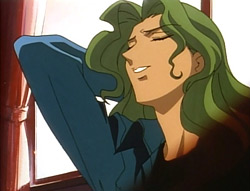 After crawling back out from under the bed, we see an unusually animated shot of him tossing his hair back. This gesture is complete with sparklies, so that the purpose of emphasizing his appeal is clear. It seems deliberately placed right after several frames of him looking comedic; scurrying under the bed and wiggling out from there, but this is a prime example of what I mentioned before. We’re seeing Saionji as Wakaba would. It would be an innocuous thing like that that would send her swooning, and as far as body language, what can be read into here does require knowing Saionji or at least behavioral trends thus far in the series.
Saionji is not aware he’s being watched. This same gesture in Touga’s hands would have been a theatrically deliberate display of his silky red hair flinging back to reveal that flawless chiseled face that he knows is exactly what the person watching wants their lips on. Saionji? Completely oblivious. His eyebrows are drawn in and upward, following the natural inclination of the gesture. (Do it, yours will act the same way.) His eyes are closed, his lips are parted. He’s smiling, but not smug. There’s no awareness of how he might be perceived here, he simply goes through the motions, pleased, but there’s no indication of the satisfaction (or apprehension) that would otherwise be present if he know how Wakaba felt right then.

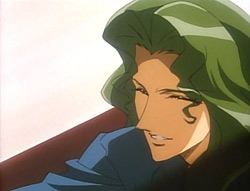 This expression is a staple in anime, but Shoujo Kakumei Utena makes sparing use of it. Though it is an exaggeration, it’s often so because it’s stretched out over conversation. This is not the case in Utena, where it often doesn’t even morph the face into a super-deformed style.
A willingness to prolong blinking, or to shut the eyes for greater periods of time, is a sign of trust and comfort. People blink faster when they are around someone they do not trust or like, and the opposite is also true. A deliberate slowness in blinking is flirtatious because it’s a display of intimacy and trust, where faster blinking has nothing to do with wanting to see your subject more. It’s about keeping an wary eye on them.
This is combined with the tendency people have to close their eyes when they laugh, a trait that’s especially accounted for in more demure cultures like that of the Japanese, where closing behaviors often accompany what are considered unbecoming displays of emotion. For example, the woman that covers her mouth with the sleeve of her kimono when she laughs, even if it’s not a loud one.
Anime uses these behaviors combined with exaggeration to indicate when characters are happy. When the expression is directed toward another person, just as in real life, it suggests comfort and a liking for the person they’re dealing with. Wakaba and Saionji direct this unusually open and intimate expression towards each other.
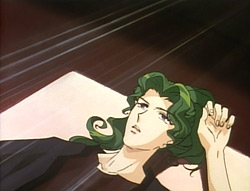 This should look familiar to most of us. Saionji is alone, on his back, staring at the ceiling, with no discernable facial expressions that aren’t created by gravity. His mouth is open, and you can see his teeth. His eyes are neither dilated nor constricted, and his eyebrows are slack, expressionless. A hand is raised up near his head, which is classically a gesture showing an attempt to think, but can also simply be a matter of comfort in a position, and that his fingers are completely slack suggests the latter.
Hopefully at some point in your life you’ve just thoroughly zoned out, and at that time, you looked like this. There was probably some issue you needed to address, because people do this more under stress, but this is nothing more than the blank staring at the ceiling someone does when they’re thinking about nothing at all. To contrast, when Nanami realizes she is not related to Touga, she flings herself on her back and stares at the ceiling. The difference is we know she’s thinking, and even without hearing her train of thought, we’d have had her eyes, which were not expressionless, and her mouth which was deliberately closed, to rely on.
That we see this from Saionji suggests two things. One, that he’s zoning out instead of addressing his problem of what to do with himself now, and two, that he has the idle time to do such a thing. Though he appears to enjoy Wakaba’s company when she is there, when he’s alone, he’s left with the realization that this cannot continue, and his goal of getting back into the school is clear. The problem is he seems unable to think of a plan and so resorts to doing nothing and wallowing in it, spending his time staring blankly and thinking of nothing rather than working on his connections and trying to think of a plan. This may also include a reluctance to go through the shame of admitting his failures to others in pursuit of their favor, which he’d need to get back to his old position, but there’s no broodiness in this shot, no sign that he’s disgusted with himself at that moment. Only that he’s not sure where to begin and not in any rush to figure it out.

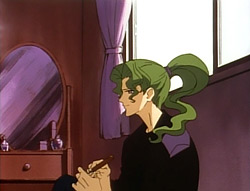 When Wakaba asks Saionji what he’s making, he stops what he’s doing and looks up at her, smiling, only to look down again and resume working before answering that it’s a secret. He’s disinclined to look her in the eyes when he says what he’s doing, because he feels he’ll betray something of himself if he does so. He’ll be unable to hide that what he’s doing means something to him, or he’ll be unable to keep the secret.
A more self-aware person might have gone through the same gestures to encourage curiosity, but Saionji looks back down to keep himself from cracking a smile wide enough to betray him. As it stands, he still kept the smile he looked up with when he returned to his project. This is a secret, shy kind of enthusiasm people often have about gifts they’re giving when the gift has value to them. In this case, the value is that it’s something he’s made himself, and though he used Wakaba’s own money to buy it, he did so at the cost of his own lunch, so that he’s in a couple ways put some of himself into this small, rather sentimental gift. But because it is small, and rather sentimental, he’s appears shy about it, and not quite willing to admit he might be proud of himself for such a minor thing.

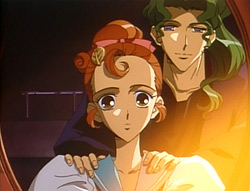 A secret gift someone’s shy and a little proud of is a hard secret to keep, and Saionji, despite his earlier reluctance to give it all away, only moments later does exactly that. Why? Perhaps out of urgency to thank her in the best way he knows how, perhaps also to see her reaction and put at rest the nagging feeling it might not be enough. Either way, when he tells her it’s a gift and a thank you for her devotion, he does so with his voice even, looking right at her with his eyes relaxed, a calm smile, and his hands rather intimately placed on her shoulders. (Again, his use of physical contact to make sure he’s being listened to.) Wakaba’s wide-eyed expression doesn’t seem to faze him, and his calmness despite her obviously overflowing emotion (she does start crying) suggests he’s either oblivious to how much she really cares (unlikely at this point), or he’s seeing exactly the reaction he expects and hopes for. He wants her to be moved.
This is another example of Saionji’s emotional honesty and willingness to create a mood of intimacy. He’s unafraid to touch her, there’s no tension in his shoulders, no narrowed eyes, nothing to suggest there’s an agenda or any form of deception here. The only oddity is that he’s not technically looking her in the face, but rather looking at her reflection in the mirror. This small boundary is enough to steel him against his shyness, and being able to see his own expression as well as hers makes it easier for him feel he’s properly conveyed his meaning. It’s likely being understood is an issue for him; for all his honesty, Saionji’s temperament and violent behavior make people trust what he says far less than they should.

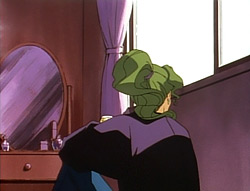 Saionji looks out the window when he asks about Anthy. The window is used in these episodes to symbolize the school, the world Saionji eventually means to return to, and can probably actually see through it. It makes sense he would look in the school’s direction when asking about someone that reminds him of it, except he’s managed not to look thus far, though the school was already the topic of conversation. His body language here backs up something made very plain in the dialogue by his reluctance to bring it up. Saionji knows he shouldn’t ask Wakaba about Anthy.
Saionji’s carefully dodged Wakaba’s romantic interest in him, referring to her devotion without claiming to know the source of it, and he’s been kind and polite with her but done nothing else to encourage a romantic relationship. This seems to be very deliberate obliviousness on his part; he may know she cares about him but he probably doesn’t believe it, and either way, doesn’t want to encourage it. He’s already made his bed with Anthy and he intends to stay in it.
He can’t even look in her direction when he brings Anthy up; he knows the subject will hurt her, though how much it’s going to hurt is probably lost on him. It’s hard to say whether he chooses to hurt her simply because he needs to know that much, or whether he does so to forcefully create distance between them. Maybe Saionji is starting to feel too attached to where he is and who he’s there with, and so in the gentlest possible way (for him) is trying to remind the both of them that it can’t be. The latter might be a bit calculated for Saionji, but this gesture suggests a shame and reluctance in what he’s doing, as well as a need to steel himself to go through with it. Saionji feels that this is a question he has to ask, whether or not it hurts Wakaba, though he obviously has nothing against her.

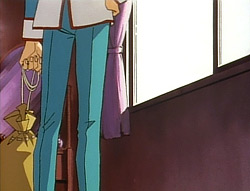 What’s this? A hipshot pose, stick straight posture, and a hand placed cockily on his hip? The moment his uniform is back on he seems to reclaim all the posturing and exaggerated egotism we’ve learned to expect from him. His safe little vacation is over and he wears the uniform once more, and that means he’s vulnerable again for attack, and has to have his guard up. The image of the uniform looming in the background of these prior scenes was clearly as influential onhim as it was on us; the momenthe changes into it,his status is elevated to Vice-Principal again. What’s this? A hipshot pose, stick straight posture, and a hand placed cockily on his hip? The moment his uniform is back on he seems to reclaim all the posturing and exaggerated egotism we’ve learned to expect from him. His safe little vacation is over and he wears the uniform once more, and that means he’s vulnerable again for attack, and has to have his guard up. The image of the uniform looming in the background of these prior scenes was clearly as influential onhim as it was on us; the momenthe changes into it,his status is elevated to Vice-Principal again.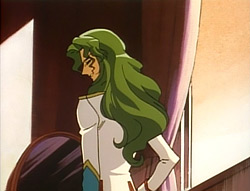 He’s clearly happy to have that back, but it didn’t come without a price. He’s clearly happy to have that back, but it didn’t come without a price.
Saionji speaks of expensive gifts and shipping them to her room all without once glancing up at her. This is the afore-mentioned passive domination, an attempt to create an air of superiority by denying the intimacy of eye contact. His hand’s on his hip, his eyes closed, and he’s smiling. We’ve managed to leap right back to the first arc, without a trace of the man that was laughing and smiling so serenely whenever Wakaba walked into the room. This is easily another angle of the pose from the shot before this one. Saionji’s defenses are up, and his vacation is over.
And so...?
Nothing in Saionji’s body language during his stay in Wakaba’s dorm suggests he disliked being there. He didn’t even appear suitably ashamed of himself at the time. I think we can safely conclude, by his character elsewhere, that this had far more to do with the situation than it did his slipping sense of pride. There were no critical eyes on him at the time, and without that discouraging element, he couldn’t psyche himself into being too ashamed to stay, or even too ashamed to be happy there. When he does learn that Mikage, someone from ‘his own world’ (to paraphrase him) knew about what he was doing, he reacts unsurprisingly.
Saionji: When, I mean how'd you get in here?
Saionji is more concerned with when Mikage discovered his whereabouts than how he intruded on them. Before he realizes to ask the more pertinent question, he tries to find out how long Mikage has known about what he immediately remembers is a disgrace. Who has he told? Is it now public knowledge with his enemies? (That is, everyone at the school including Touga.)
It takes very little prodding on Mikage’s part to remind Saionji of the deplorable, shameful situation he’s in, and by the time a way out is offered, Saionji leaps on it.
Mikage: We are distressed by the future prospects of the Academy.
Mikage: Your talent is very precious.
Saionji: I see, so that's how it is.
Saionji: What should I do instead?
Saionji clearly understands what’s being proposed, that he might potentially go back into the council simply as a mouthpiece for Mikage’s organization. He agrees to such terms before they’re described, because all he wants is his position back. The power of that position and preserving its integrity aren’t quite as important as simply having it. Saionji hadn’t the vaguest idea Mikage would want the hairclip, and it’s a curious move on account of the series to not show us how he reacts when he finds out. We see him later where he appears pleasantly surprised Mikage asked for so little, but the immediate reaction is lost to us.
He’s, despite himself, a smart boy, and clearly familiar to some extent with Mikage and possibly how he operates. It should have been suspect that he would ask for something Wakaba wept over the thought of receiving. Its apparent lack of value elsewhere indicated its value here, and one can’t help but wonder if Saionji’s calling it a little thing later was him trying to convince himself it was no big deal. After all, what could Mikage really do with that clip but use it to hurt Wakaba somehow? This is the most obvious possibility, and Saionji is intelligent enough to realize that. Whether he let himself or not is another matter, but the series is consciously vague about letting us know whether Saionji sees that his status will return to him at the cost of Wakaba’s feelings. We don’t know how Saionji reacts when he wakes up, having as he does all the pieces to figure out what happened. Nor do we learn whether he put those pieces together; the Saionji we see immediately after the duel is drunk with joy at his return to the school, and there’s not a trace of remorse or awareness of the price paid. He either avoided reasoning it out or has completely put it out of his mind. That we know of, he never speaks to Wakaba again.
Looking back, he probably recalls this period as a shameful and weak time of his life, where he hid under the good graces of a young girl, unable to move on without being hand fed an option by a superior. Which is to say he probably avoids thinking about it at all, but really, was it so bad? Didn’t he seem so relaxed around her? Content in not having to put up a rigid front? If he could have purchased an expensive gift for her, why didn’t he do so then, rather than forego the lunch she paid for to buy a small trinket that he himself had to finish? An expensive gift sent to her dorm is as distanced a gesture of gratitude as humanly possible. The man that was living with Wakaba didn’t want to create that distance. He wanted his gift to include something of himself.
Everything about the hairclip, including how he presents it to her, suggests a capacity, even longing, for intimacy that Saionji vehemently denies himself in every other episode of the series. Whether this stems from affection for Wakaba, love, or simply appreciation doesn’t matter so much as that in any of these cases, we see a rapport with her that he has with no one else. Would he dignify his ‘friendship’ with Touga with such a personal token? Would he offer Anthy something so ‘simple’ as his own time and patience?
Most telling, and why I approached this in terms of body language, is the other gift he gives her. He voluntarily put something of himself in the hairclip, but he also voluntarily put himself into his interaction with her, allowing her to see him in an unguarded, relaxed state. He felt safe enough with Wakaba to behave in a manner he would never show anyone else in the series. After all to relax his muscles so would only make it easier for Touga to rip his heart out. (Again.) Later he might reason out that he was so unguarded because Wakaba was a weak, adoring little fangirl and hardly a threat to him, but at the time we see no evidence of his usual practiced disdain for inferiors. He even repeatedly honors her with physical contact. There’s a willing, conscious pursuit of social and physical (if not sexual) intimacy here that would have proved impossible if his usual defensive mechanisms were in play.
Saionji senses he’s safe and that his gestures of intimacy will be reciprocated, and that’s all it took. Someone with such a strong, stubborn front only betrays in that front how vulnerable they are behind it; Saionji behavior here shows him to be a man that longs to be close to others, to be himself, and to not feel like he must create a distance for protection. Saionji is crushingly, hopelessly lonely, and unlike his friend Touga, unable to live the front enough to forget what’s behind it.
Why Wakaba, though? Why, if she was so good for him, does their relationship go absolutely nowhere? What Saionji wants (status, personified in Anthy) and what Saionji needs (someone supportive and loving) are naturally grossly different things, and while he can believe he’s entitled to one, his self-esteem is such that he doesn’t think he deserves the other. On the outside, and certainly to himself, Saionji severs his contact with Wakaba so thoroughly because she’s evidence and the reminder of his time of weakness, when he wasn’t in his place in the student council, when he couldn’t wear his uniform. Deeper down though, it’s likely he pushed her away to defend the walls she managed to breach. She calmed him down, made him laugh, gave him a safe place, and that’s dangerous. Saionji regards his sensitivity and his desire for intimacy as weaknesses, not things to be nurtured and encouraged. In this there’s some truth; Saionji lives on a battlefield that would show no mercy to this side of him, but he’s the same as any other member of the council in that the least healthy thing they could be doing is participating in the dueling game. It is possible that Wakaba could have brought out the better in him, and romantically speaking, perhaps they might even have been a good pair, but he couldn’t allow himself that. His abusive behavior and coldness to others is how he validates his low self-esteem, and defensive mechanisms being what they are, he’s very invested in not letting anyone tamper with his delicate balance of self-loathing, cruelty, distance, and assuredness that he deserves no better than to be alone in this world.
  |

